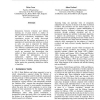Free Online Productivity Tools
i2Speak
i2Symbol
i2OCR
iTex2Img
iWeb2Print
iWeb2Shot
i2Type
iPdf2Split
iPdf2Merge
i2Bopomofo
i2Arabic
i2Style
i2Image
i2PDF
iLatex2Rtf
Sci2ools
107
click to vote
GECCO
2000
Springer
2000
Springer
A Note on Learning and Evolution in Neural Networks
Interactions between evolution and lifetime learning are of great interest to studies of adaptive behaviour both in the natural world and the field of evolutionary computation. This contribution revisits an earlier discovered observation that the average performance of a population of neural networks which are evolved to solve one task is improved by lifetime learning on a different task. Two existing, and very different, explanations of this phenomenon are summarised and examined. Experimental results are presented that demonstrate that neither of these explanations are sufficient to fully explain the phenomenon. A new explanation, together with experimental justification, is presented which describes the effect in terms of lifetime learning providing a buffer against the potentially deleterious effects of mutation.
Adaptive Behaviour | Earlier Discovered Observation | GECCO 2000 | Lifetime Learning | Optimization |
Related Content
| Added | 24 Aug 2010 |
| Updated | 24 Aug 2010 |
| Type | Conference |
| Year | 2000 |
| Where | GECCO |
| Authors | Brian Carse, Johan Oreland |
Comments (0)

